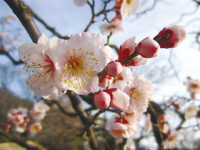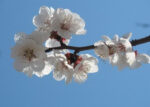梨花的花語是純真,代表着唯美純淨的愛情,但是也有諧音“離別”的意思。
The flower language of pear is innocence, representing beautiful and pure love, but it also has a homophonic meaning of “parting”.

據說據說梨花雖然很好看但在中國古代大戶人家的府里都不會把梨花種在最重要或顯眼的地方,因為古時人們講究吉利,而梨花是白色的,而且「梨」諧音「離」——離散,因此故被古人認為視不吉利的象徵。
It is said that although pear blossoms are very beautiful, they were not planted in the most important or conspicuous places in the homes of wealthy families in ancient China, because in ancient times people paid attention to auspiciousness, and pear blossoms are white, and “pear” is a homophonic word for “li”. ——Dispersion, so it was considered by the ancients as an unlucky symbol.
三月桃花花神- 戈小娥
戈小娥,元順帝之淑姬,宮中七貴之一。 戈小娥端莊溫柔,嫡淑可人,元順帝之所以寵愛她,是喜歡她那絲緞般光潔滑膩的皮膚。 戈小娥的皮膚粉嫩細白,微微透紅,如桃花含露,嬌翠妍美。
March Peach Blossom Goddess – Ge Xiao’e
Ge Xiao’e, the concubine of Emperor Shun of Yuan Dynasty, was one of the seven nobles in the palace. Ge Xiao’e was dignified, gentle, and lovely. Emperor Yuan Shun doted on her because he liked her smooth and smooth skin like silk. Ge Xiao’e’s skin is pink, white, and slightly red, like a peach blossom containing dew, delicate and beautiful.

《梨花》 元 方回
仙姿白雪帔青霞,月淡春濃意不邪。
天上嫦娥人未識,料应應清雅似梨花。


